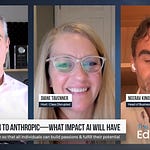Two innovators in education, Laurence Holt and Jacob Klein, have teamed together to create a market map for charting the path and impact of AI in K–12 education. The map not only charts places that new AI companies and products are entering, but also highlights where AI could make a positive impact in a not-so-subtle nudge to innovators. In this conversation, we walk through some of the big trends they see unfolding; speculate about where AI has yet to have big impact and still could; talk about some of the real risks of AI in education; and discuss how you can help Holt and Klein keep the market map up-to-date. Here's the link to the market map.
As always, subscribers can listen to the podcast, watch it on YouTube, or read the transcript.
Michael Horn:
I'm joined by two people who've been thinking a lot about how to do this over the many years. Laurence Holt and Jacob Klein, two longtime entrepreneurs, innovators, big thinkers in education about how to create a better world for educators and the students in it. And guys, it's good to see both of you. Thanks for having this conversation. Why don't I kick it off to you as we start the conversation to just give the thumbnail sketch of how you come to the conversation even before the artificial intelligence part, just education in general, how you got into this field and sort of your backgrounds, because both of you have very entrepreneurial and innovative pathways in it, but different pathways. So, Laurence, why don't you go first?
Laurence Holt:
Sure. So I'm originally an engineer, software engineer, and joined Amplify, an Edtech player in Brooklyn when it was fairly small and was chief product officer there for over a decade through the entertaining ups and downs and left about two years ago to spend time with family, but also pursue some philanthropic interests and support entrepreneurs. And that has pointed me directly to AI of late.
Michael Horn:
Terrific, Jacob.
Jacob Klein:
So I've been tutoring students for many years. I was a teacher at a KIPP school briefly. I went back to school and got a master's in Learning Design Technology at the Stanford Graduate School of Education. And while I was there, I was able to start the company that became Motion Math suite of games around teaching K–8 math, especially trying to leverage new technology, which at the time was the iPhone and the iPad. We were able to grow that company and sell it eventually to Curriculum Associates, where we continued to grow our suite of math games, now called iReady Learning Games. I just left there a few months ago. I've been consulting for several companies in the AI edtech space, including Oko Labs and EdLight, and really excited for the future of this field.
Michael Horn:
Awesome. And you guys teamed up, you built this thing called the AI in Education Map. It's an article on Medium is sort of where it lives. But tell us what is on it, what are you tracking? And we'll get into the why and sort of those questions in a little bit. But let's start with what is it at its surface level?
Laurence Holt:
Sure. And if people can't, presumably you'll link it in the show notes.
Michael Horn:
Exactly.
Laurence Holt:
If you just search for Medium and AI and Education Map, people will find it. It is a map of use cases or sort of jobs to be done that can be supported by we believe can be supported by generative AI, specifically around teacher practice and teaching and learning in general, in and out of classrooms. So it is not a map of startups in the space. It includes that, but we want it to be broader than that.
Michael Horn:
Gotcha. Jacob, would you add anything on that description, or does that sort of capture what you think it's doing in the field, from your perspective?
Jacob Klein:
Well, I think starting from all the work to be done points out places where there's many companies, particularly in content generation, have already started, and there's going to be some great companies built there, but also places that we're not aware of any companies starting yet where we still think there's huge potential.
Michael Horn:
Yeah. So let's dig into the why, then, behind this that you created it. Laurence it occurs to me that in past efforts of technology and education, there have been various actors that have been well funded to come together to sort of try to create an edtech market map at the moment, or whatever else. It doesn't seem like this has been the case in AI so far, and you all have created this map. What was the motivation for doing so?
Laurence Holt:
There is just so much going on, and as you point out, a lot of it is sort of point innovations, right, smaller things that people are just trying because you can do them so rapidly. And we wanted to make sense of that for ourselves and understand what's out there, but fit it into some kind of a structure that was we thought it'd be just as a time capsule. It'd be sort of interesting to capture it in its early stages and then update it regularly and see how it develops.
Michael Horn:
Now, Jacob, against that line, we're going to get into the categories and the different jobs to be done or tasks that you see that AI could do in a moment. But you all have this set of risks right at the end of this, with AI in the article itself, why did you include a section like that in what probably isn't going to be seen? People aren't coming to look for the risks. They're coming to look for the heat map, if you will. Why did you include that?
Jacob Klein:
Yeah, there's a very overly optimistic side of our field where every new technology, there's an excitement. This is going to transform everything.
We're finally here. I was pleasantly surprised, for example, that the New York Times article on Khanmigo a few months ago took an appropriately skeptical approach. And I think you can be bullish about this technology. It's magical in a lot of ways while still looking for all the risks that have diminished the impact of other technologies in Edtech. And there's a more profound one, I think, with generative AI, which is really a redefinition of thinking and of writing and of really intellectual work that threatens or has the potential to redefine a lot of what schooling is about. So I think it's important to be aware of those risks as we go around developing and looking for yeah, and.
Michael Horn:
There's some pretty big heady ones in there. Atrophy of critical thinking. Right. That's a pretty heavy risk that you list there you have the null hypothesis and hallucinations, and some of those that are probably more well guessed at, if you will, by folks. But just take that one for a moment. The Atrophy of Critical Thinking, what do you mean by that specifically? And sort of what's the worry?
Jacob Klein:
Well,
is probably the best writer on this topic. He had a good essay a couple of months ago. What does it mean when you can get a I don't know, B minus essay by clicking a button? It really raises the floor, which could be a good thing. But you could see there certainly will be quite a few students that that's really what they do. Whereas before they would maybe attempt more effort to write a good essay, now it's what ChatGPT will spit out. The AI detectors don't seem to work. So that is a real risk, is that a lot of students will use the tools, not understand how they work, not question them critically, and just not learn much.Michael Horn:
Gotcha. Now, as we look at the actual categories itself, Laurence, let me turn to you on this one. You have both sort of real items and categories, and then ideas are almost it reads like wish lists of gosh, I hope someone develops this. Tell us about the different categories and how you've created them.
Laurence Holt:
Yeah, that's exactly right. We wanted to map what we were seeing, but also what we thought was possible, but we haven't seen yet. And so we've sort of got different colors on the map to highlight that. And that comes from a thesis that is sort of thinly veiled, which is that if we think about evidence based practices and engaging practices, the kind of thing that we write about and you write about, but that we don't see widespread in schools. I'm thinking about things like, say, role play or project based learning or competencies or just feedback for students. They're often a common theme may be that they take a lot of effort, that they either in the preparation on the teacher's part or in the execution. They're hard work in their current form. And so we began to wonder, well, what if there was an assistant teacher that could make that a lot easier still under the direction of your teacher, but essentially remove some of the obstacles in teachers days and free up time.
And therefore maybe we'll see these practices suddenly becoming, or maybe gradually becoming much more widespread, and that could itself be disruptive and transformative.
Michael Horn:
Yeah, I want to turn to this in a moment, but I actually want to do the curveball here because, Laurence, you wrote one of the more interesting articles, I think, in Education Next, a couple of years back, if I recall, my timeline may be off and I'm probably going to surely bastardize what you wrote. But in my telling of it, you talked about how there's these findings in different streams of scientific research, in effect, where we know that individuals with different chromosomal footprints, for lack of a better word right, seem to have different learning patterns. It might explain ADHD or it might explain they might need more greater number of dopamine receptors and things of that nature, which may change the way you educate them as well. I'm just sort of curious and you could probably summarize this better than I just did, but one of the takeaways I had from that know, your average software program, it might reach one subset of those kids but probably not the other, and you need to tailor it. Is it your perspective that even in the world of AI, where a lot of know to the point Jacob made about all the hype and stuff like that, it's going to personalize, it's going to realize these categories? Is it your perspective that we're actually going to have to custom build for these different archetypes that maybe exist out there? Or will the AI be able to sort of intuit some of these underlying genetic differences that explain some of the learning differences that we sometimes don't talk about in education?
Laurence Holt:
Yeah. Wow, lots to unpack there. The finding is that, and it's quite an old finding in psychology that humans respond differentially to interventions and approaches and learning paths. You could imagine. In fact, researchers found a set of students who responded extremely well to an online reading tool, for instance, and others who didn't. And when I was building and Jacob were building a lot of these products, often the question was does it work or not? And what this research says is that's the wrong question. The right question is for whom does it work? And if you knew that ahead of time, then school can become more of a matching to the way you want to learn and to effective practices for you. Now, we've walked ourselves right back into the well, that sounds like a lot of work on the part of somebody problem.
And so to your question about who's going to figure that out, in some senses it's quite easy to figure out. You just try things and the ones that work, you see the needle move, right. And that's what you should do more of. But it does mean that you have to make available to students several different ways of working and that can be difficult to do in one class or one school, right. Where AI, certainly we feel could help with that.
Michael Horn:
It's super interesting. It's just a fascinating article that I still think more people ought to dig into and wrestle with the implications of. So what have you found in terms of the categories that you've mapped so far, just a little bit about what's on the map itself.
Jacob Klein:
It's moving very quickly. I was really impressed with Reach Capital's latest market map, which has some connections to our own. There's a lot of content generation, lesson plan generation startups and existing players that are working in that area. There are some great companies around teacher coaching, teacher support tools, as well as grading. One company that I've worked with, Edlight, is working on the problem of feedback to student handwriting, which I think has a lot of potential to get out of just purely digital interfaces for math homework in particular. So we're seeing really a Cambrian explosion of companies and efforts within existing companies to bring AI into their products. What we haven't seen as much as Lawrence mentioned, is bringing some effective, innovative pedagogies to teachers at a lower cost both of price point and the mental cost of implementation and grading. That's some of the more exciting work, I think that can and hopefully will be done.
Michael Horn:
Why do you think that or other and what other areas are unexplored? But why don't you list some of the areas that are unexplored still in your mind as you look at the map? And maybe some hypotheses for why we haven't seen either what you just talked know, lower cost, easier implementation, or perhaps certain categories that remain somewhat unfilled on the map?
Jacob Klein:
Well, as Laurence mentioned, project-based learning, competency-based learning, some social models of learning, jigsaws, simulations, role plays that might know the capstone to a semester course, but not something that a teacher implements every week into their classroom, just because the prep time, let alone the grading time, is really difficult. So I think it's natural that companies are looking for existing models that teachers already know, that already implement and saying, we can do this much quicker. I think the next stage will be you may have tried this work occasionally, but here's a way to do it every single week for only an hour of your time. And particularly social models really interest me. There's some interesting academic work out of Dan Schwartz's lab at Stanford of teachable agents I've never seen that brought to scale. AI could help with that. There's a lot of great work in academia that hasn't been brought over commercially to education, and AI could potentially support that.
Laurence Holt:
So this goes to, if I can add Michael, and this is your field more than ours is whether what's going to happen in education is that AI is essentially sustaining innovations as it appears to be outside of education. The winners peer to be Google, Microsoft, the usual suspects. Will that happen in education too? And the low hanging fruit is to go to things that teachers already do, so maybe they go to teachers, pay teachers to find a lesson. Well, now I can go to one of a dozen different lesson generation free websites and do the same thing, whereas the more disruptive innovations would be enabling new models, enabling new practices. So the big question is, will that come later or not?
Michael Horn:
What are both of your hypotheses on this? Because I agree with your general observation that outside education largely, it seems right now and look, it could change, right? But right now it seems largely that it's been a sustaining innovation to those tech giants, right? It's not a wholesale platform that changes the cost structure and if anything, it actually increases costs. Right. It seems education seems unclear at the know. Jacob, from what you just said so far, actually, we're not seeing maybe a lot of disruptive activity because we're not seeing dramatically lower costs, greater accessibility, greater simplicity and things of that nature. What do you both like? Where do you think the dominant do you think it'll be the incumbents that really sees hold of this, or do you think we'll see a wave of startups?
Laurence Holt:
We're definitely seeing the wave of startups.
Michael Horn:
I should say startups that will disrupt. And last, I guess, should have been the question, right?
Laurence Holt:
Yeah, that's a different question. I think there's with education, as you know, it is not just a case of applying the technology and doing something that gets a wow, it's the user experience. It's that how do you make that part of the fabric of teaching and learning in a classroom? And that's a much higher barrier. And so I think whether some of the more innovative companies will actually be rolled up into something that adds up to being something more disruptive, I think that's all still to be seen.
Michael Horn:
Jacob, what about you? What's your take on where this is going to go?
Jacob Klein:
Yeah, I think eventually there's got to be a simplification and some kind more coherence, more integration of tools. Now you have early adopters exploring a lot of things. I mean, ChatGPT in a way is a unification of lots of different separate kind of chat, bots and previous AI tools all packed into one. But I think my sense is that we're entering an era of even more fragmentation, with the voucher states putting public money into different school models, with some of the pipeline to college pulling back and more people realizing that there's other career paths that can be really fulfilling. So I think there will be some unification, but also a long tail of more niche use cases that optimistically support more diverse learners.
Michael Horn:
I want to go toward one of the points that you just brought up, Jacob, in a moment around new schooling models. But first a different question, which is one of the other theories that I've had is that we're going to see a lot more learner agency in this world of AI, more tools that put the learning and the power of AI directly in the hands of students themselves. What are you seeing on the map? What are both of your takes on that possibility or not.
Jacob Klein:
I hope you're right. I mean, this is a golden age for kids who are autodidex. You already had Wikipedia. Now you have some pretty good virtual tutors that can guide you through material, point you to new material, challenge you. So for the kid who already feels that agency and in charge of their own learning, really the sky's the limit, even more than was true before. So that's very exciting. How do you get other kids to feel that way? Some kids need much more social structure, and I think that's where some startups have a bit of a blind spot thinking that each kid, if only given the tools, is going to direct their own learning. They need a teacher, they need a peer group, they need those social cues as to what they should be learning.
That guidance. But I think AI could certainly support teachers, support counselors, support individual tutors with students to help students find that agency.
Michael Horn:
Laurence, what's your take on that question?
Laurence Holt:
Yeah, I think also that the answer to it may be in the details, in the specifics, that maybe there are areas where we will start to see some real disruption. If I were to pick a couple with the certainty of being wrong, probably. But it's the old sort of killer app idea. What's the killer app for? A Macintosh or something like that. And one of them that I'm quite excited about is feedback. Students getting more and better and faster feedback. We know that drives learning and we know that on average, students actually don't get much feedback. That in fact, teachers don't always set long open ended work because it's a very, very big grading exercise for them across a load of 150 students.
But what if they did set more open ended questions and that students were able to get quality feedback, perhaps marshalled by the teacher, so human in the loop feedback and a chance to revise what they've worked on, which they often don't get in school today. That all seems to be within the reach of generative AI right now, and there are some people working on that. So it may be as specific as that. There's just a big lever that starts to really take off.
Michael Horn:
Yeah. And so obviously then my head goes when you mentioned that to we may need to create some new schooling models that can absorb that sort of change in use of time and things like that, right, with educators and students. But it also brings up another thing that I've thought a lot about, which, know, could you use AI as an enabling technology to be the kernel around which you build new school? And for know, Imagine Worldwide, right? They have their work in Malawi and Sierra Leone and places like that in Africa, literacy and numeracy and you add AI to that, it becomes much more powerful and then you start to have sort of grassroots-based communities, rethinking school, maybe around that kernel. Or Jacob, you mentioned the states with the education savings accounts, right? Very new school models that can start to pop up, potentially powered by AI perhaps in a variety of different ways. Are you all tracking that at all? What are you seeing? If so.
Laurence Holt:
Yeah, firstly, I think you're right that we've been talking about US education for the last 15 minutes, but actually there are other areas that could be way more receptive to innovation and low and middle income countries where the problem is often the teachers may not be there today. And so assuming we have the bandwidth, the infrastructure is available, which it is more and more, but there's still work to do, that could really be a big transformation. I think also microschools, potentially homeschooling, these are areas where it's a big lift to set up a micro school right now. And this proliferation of AI tools may make it considerably easier. But we haven't seen anything yet that is specifically sort of generative AI for microschooling. It's more the case, I think, that the whole map has got use cases on it that should give microschools a boost.
Michael Horn:
As we start to wind down here, the other question I want to talk about is this map is big. There's a lot of different areas. I don't even know if we've given people the full sense of just how many different categories you have on it, but you have sort of your macro categories of teacher practice, support, classroom material, evaluation and feedback, student support, and then within each of those you have more and more categories. I think we can show some video of this as this conversation goes live, but I'm just sort of curious as you step back and look at it, someone that jumps on the site, they look at the map. What are, for each of you, the most interesting or two to three most important things that come out of it in each of your views?
Jacob Klein:
Yeah, I think one of my main takeaways would just be the diversity of use cases. And I think eventually AI will be equivalent to just the word digital. I mean, it's just embedded in almost everything that why not? Would you include some intelligence, some generative content, some other AI in the software that you're creating? So I think eventually it becomes an invisible technology in most use cases. And also we're just at the exciting beginning. So I think it's a really exciting time in technology in general in Edtech, and I hope that we will learn from previous mistakes of other cycles of Ed tech that will insist on rigor, that we won't lose the humanity at the core of education. And I think if we do that, there will be some amazing new models and as you said, an increase in learner agency.
Laurence Holt:
Totally agree with all that. I think just to name a few specifics that we're excited about feedback I mentioned. I think that's just potentially an easy one to see progress on. One entrepreneur used this really interesting phrase that I love, which was modifying with rigor. There's a lot of sort of modification of curriculum that goes on out there, as we know. And sometimes it is teachers trying to find activities that they know their students can do, but that might have the unwanted side effect of reducing the rigor. So how can you modify a lesson but keep the rigor? There have been some experiments that have shown AI may be able to do that tutoring. We've seen so far a sort of one to one homework help style of tutoring, which we know is not the style of tutoring that actually gets an effect in literature.
Laurence Holt:
It's much more intensive and guided by the tutor. And so can we start to see that small group and social would be the last one? I'd mentioned that people think AI putting AI tools into classrooms is going to reduce the social aspect. But actually these tools can be great at managing discourse and encouraging discourse and role play and debate. So I think there's some really interesting places we could start to see evolving there. I will say we haven't seen in the last couple of months while we've been tracking this, a whole lot of new use cases. We've seen a few that will add to the map. But I think the territory has been the first wave of exploring. The territory has been pretty thorough.
Michael Horn:
That is interesting, right? I guess a frenetic amount of activity and maybe then people are pausing to try to figure out now where to go from here.
Jacob Klein:
One other thing, Michael, is just I'm very inspired by companies, AI Camp and Mindjoy being two of them, that are bringing students right to the bleeding edge of the technology, giving them the tools to start their own experimentation, not just as a consumer, but really as a co creator of some of these tools. Because often it's young students that are going to expand the map to think of new use cases, that are going to have AI natives that are going to grow up with these technologies, that are going to be able to teach us about the best use cases.
Michael Horn:
Really important point. I hadn't even thought about that piece of it. It weaves into the last question where you all just took us naturally as we wrap up here, which is how are you keeping this map up to date? What's the frequency? How can people help? Can they contribute to the map? Because I suspect a lot of folks, they want a view into this and they want a view that continues to evolve as others come into the space or other incumbents launch their own innovations in AI to perhaps tackle some of these use cases. How can people help?
Laurence Holt:
Yeah, we're working on an update for later this year and we would love help. So we were going to call on your audience, maybe to do some of the work for us. Certainly anything that people feel is missing or wrong, we would love to hear about that. Probably the easiest way is just to add a comment either to the show notes here or to the Medium article. We will track all of those.
Michael Horn:
Perfect. I will put that up top as well so people can make sure to keep track. But Jacob Lawrence always admire both of your activity, entrepreneurship and thought leadership, but also that you guys took the initiative to actually give some organization to what is a very fast emerging space that all of us are trying to keep track of right now and see where it's going to go. And as you said, there are some clear risks. There's some clear risk of null hypothesis that it's just going to be sort of the same old cycle hype and then settle back into the rhythms. But we all want to see something bigger and better for all students. So appreciate you both and the work you've put into this.
Laurence Holt:
Thank you, Michael, this was great fun and great to see you.
Michael Horn:
Yeah, likewise. Yeah, you bet. And for all watching, check out the map. We will provide a link to it in the show notes and you can contribute to it, as you heard. Tell them what's wrong, tell them what's right. And let's keep the conversation going. We'll be back next time on The Future Of Education.












